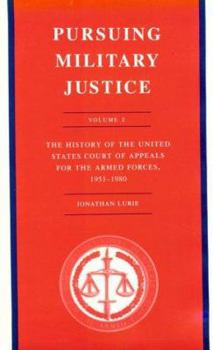Pursuing Military Justice, Volume 2: The History of the United States Court of Appeals for the Armed Forces, 1951-1980
(Book #2 in the History of the United States Court of Military Appeals Series)
In this timely companion volume to Arming Military Justice (1992), Jonathan Lurie continues the first wide-ranging investigation into the creation, judicial impact, and social meaning of a special civilian court to handle military appeals. Here Lurie tracks the first thirty years of the U.S. Court of Appeals for the Armed Forces, from 1951 to 1980, telling how judges struggled to gain legislative goals against a hostile and politically adept military. Beginning with the Court's inception during the Korean War, the author chronicles its advances and setbacks, the new consciousness of individual rights resulting from the civil rights movement, the challenges posed by the war in Vietnam, the subsequent restructuring of the military, and finally, a retrenchment against some of the changes made in the post-Vietnam War period. Lurie pays particular attention to the presidential appointments of judges. He also explores the degree to which military justice should "civilianize" its procedures, the individual rights of service members, the impact on the Court's decisions by the personalities of its judges, and the influence of various pressure groups on the course of military justice. The book implies that the defense establishment--through influence concerning the nomination/screening of new judicial appointments--has the potential to lessen the Court's overall effectiveness as a key interpreter of military justice. The interest of an organized bar involved in military justice and a greater awareness both in law schools and in the general public could, however, benefit the court as contributors of its institutional strength.
Format:Hardcover
Language:English
ISBN:069106945X
ISBN13:9780691069456
Release Date:December 1997
Publisher:Princeton University Press
Length:312 Pages
Weight:1.38 lbs.
Dimensions:1.0" x 7.8" x 10.0"
Customer Reviews
0 rating





